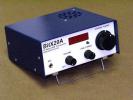With considerable difficulty (because of my stroke) I made a 20dB attenuator to reduce my 500mW down to just 5mW. This attenuator is right at the FT817's output coax connector. It also reduces the RX signal by 20dB too of course. Let's see what happens!
Normally such a small project would take just minutes but I found the whole job hard work taking at least twice as long. In the same way, PC work takes me longer as I am forever correcting typos.
My 5mW has been spotted locally once and in Denmark 853km away on 2 occasions and once in Holland. Results are in line with expectations so far. Sunspot count still good at 95. The last report of my 5mW signal was at 1744z. It must just be popping out of the noise with a few stations, rarely. I'll leave running overnight to see what happens.
On RX I see I spotted
VK6XT, even with a 20dB pad in the antenna line.
 |
| RX reports (mine) with 20dB pad in line on 40m |
 |
| 40m 5mW WSPR spots this afternoon |
 If you are looking for a basic 10W pep rig for 20m (or 17m) you can do a lot worse than build a BitX kit from Hendricks QRP kits.The basic "no nonsense" design came from India but these kits are well documented and on a neat PCB. See http://www.qrpkits.com/bitx20a.html . The full kit is $180 in the USA.
If you are looking for a basic 10W pep rig for 20m (or 17m) you can do a lot worse than build a BitX kit from Hendricks QRP kits.The basic "no nonsense" design came from India but these kits are well documented and on a neat PCB. See http://www.qrpkits.com/bitx20a.html . The full kit is $180 in the USA.






